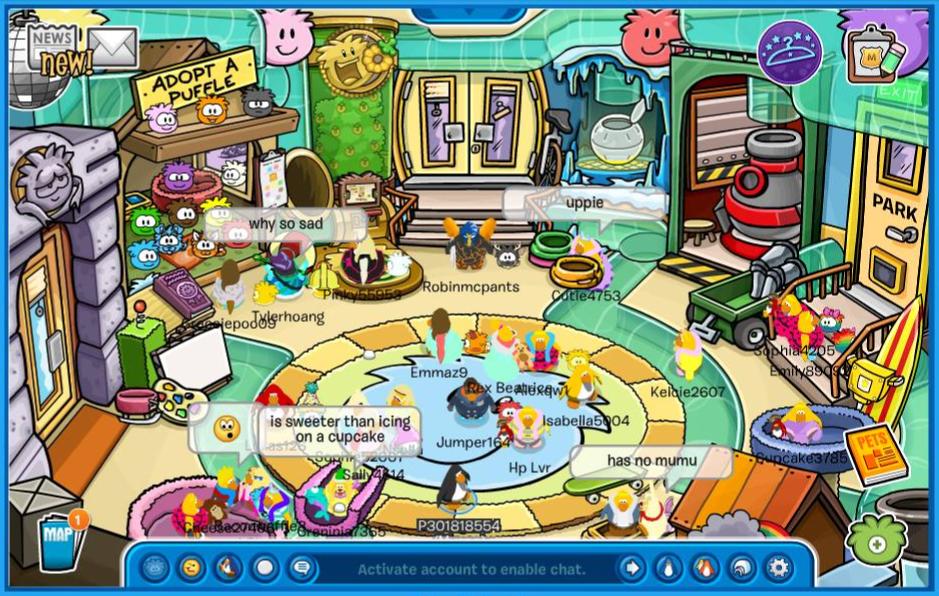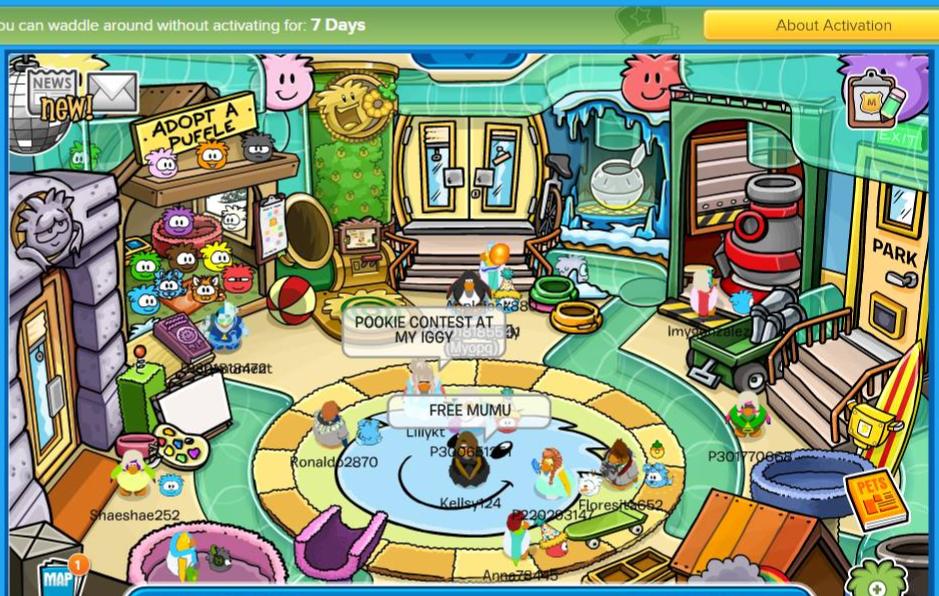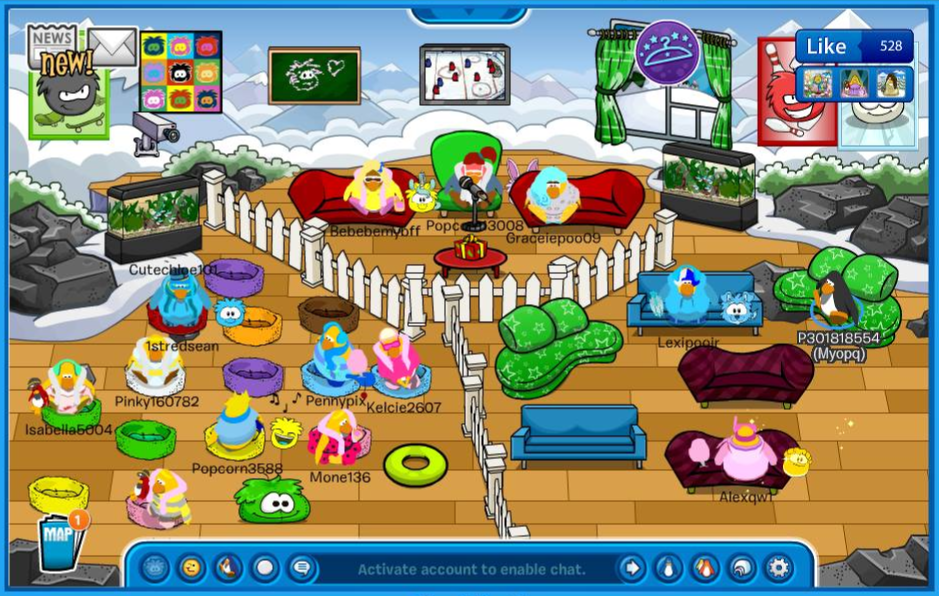Club Penguin and Pookies, a Bizarre World Viewed by an Outsider
Club Penguin, if you don’t know, is an MMO for kids where users have a penguin avatar and walk around and… do other stuff, like dress up (if you pay), decorate igloos (if you pay), and own cute fluffy pets (the cute ones are only accessible by paying). It was very successful and has garnered millions of users. However, as we all know, whenever a slice of the internet gets that many people, its quality begins to degrade. Even (or especially) if it’s chock-full of children.
Many, many years have passed since I stopped playing Club Penguin. Fortunately, I pretty much stopped long before I was able to witness the everywhere-permeating levels of shit. Perhaps they were there in the corners, but I mostly paid attention to the secret agent mission games and nothing else. Nevertheless, Club Penguin continues to exist as a piece of the internet that everyone can relate to. We all know what it felt like to waddle around on the multicoloured dance floor and the euphoric release when you finally caught the Big Fish in the fishing game. We all know to despise those who had fancy clothes because they convinced their parents to buy them a Membership.
(If you were one of those kids, I still hate you.)
That’s why places and things like r/bannedfromclubpenguin and CLUB PENGUIN RUINED get us. They are funny by themselves, but are made even more because we’ve all been there once; and the thought of swearing and making vulgar jokes in a place where the young versions of us (who didn’t even know that private servers existed) tread so lightly makes it hilarious. Club Penguin is a stage of our lives that we can look back on collectively with mirth and nostalgia.
That being said, it’s also fairly common knowledge that Club Penguin’s users have devolved into something… interesting. Quite a few of us know that many of those children have come to ‘romance’ each other and become boyfriend/girlfriend with other penguins. This is probably not out of the norm for places where there are so many people gathered on the internet, and why there are so many internet Stranger Danger lessons in elementary schools these days. But after over ten years of service, unsurprisingly, there has arisen a strange culture within the confines of igloos and underground penguin establishments. And just how deep does the fishing hole go…?
Pookie Culture
By far the most interesting thing that has come to my attention in relation to Club Penguin is the existence of ‘Pookies’. They are, simply put, users that dress up their penguins as babies, toddlers, or children, and hang around the Pet Shop to get adopted by ‘Mumus’, aspiring mother penguins. Yes, you read all of that right. It’s a huge roleplay-type way of interacting on Club Penguin. The Club Penguin Pookie Wiki states that this began “when the Fall Fair of 2009 released the Teddy Bear, beginning the ever-expanding story of Pookies”, but penguin roleplay as domesticated pets goes back even before that.

Listed on WikiHow are many different tutorials on adopting Pookies and being good Mumus. Pookies are yellow penguins and dress in ‘cute’ clothes. They also talk in a ridiculously over-the-top cutesy lexicon: “Smiles So Bright Mr. Sun Sun Gets Jealous!”, “is smaller than salt but sweeter than sugar”, “Packs Wittle Tiny Bai Bai Sized Bags!” (sic). Perhaps the whole fad began relatively normal, sane. But I am sure you can imagine how everything got played up and exaggerated in a feedback loop. In order to get adopted, Pookies looking to get adopted had be to cuter and more desirable than other the Pookies, causing layers of saccharine to build atop one another until they reached this monstrosity.

‘Mumus’ are the most common penguins that are looking to adopt. ‘Duh Duhs’ exist, too, but I have yet to see one and see far less documentation on them. Suffice it to say that everything that applies to Mumus applies to prospective paternal figures, too. Mumus dress expensively, and roleplay as rich penguins by establishing that they own pricey items: “Golden limo pulls up outside Pet Shop!”, “Settles into Elmo diamond limo!” (they seem to have a fixation on limousines…).

Many Mumus will go to the Pet Shop and adopt a Pookie from there. But another way of choosing Pookies that Mumus will often employ is hosting Pookie Contests at their igloos. After inviting a number of prospective Pookies to the igloo, the Mumu will sit on a throne-like chair at the front of the room. There are plenty of ways to host such a contest, but the most popular way (and one that I have personally sat in on) is a sort of fashion contest. The Mumu states a theme, all the Pookies change clothes to fit the theme, and the Mumu will remove the Pookie that she feels has the ugliest outfit. Over and over until there is only one standing who is, of course, the winner, and gets to live in the igloo. Everyone else must leave.
And with any popular fad, there are haters. ‘Pookie Abuse’ is yet another documented phenomenon. However, the ‘abusers’ are no more harmful than the stereotypical 12-year-old console gamer. Another WikiHow article recommends that “if you just want to avoid haters altogether, be a normal penguin.”
Analysis (NSFW text and a little taboo)
The Pookie is disturbingly (maybe wonderfully) weird at first glance, especially when all of your memories of Club Penguin are of fun, happy times, not this disgusting and borderline creepy mess. But after a while of brooding over this, and a little experience with it, Pookies go from strange to simply unnerving.
Let’s play Does This Remind You of Anything? Probably the first thing that comes to mind when you think of baby/mother roleplay is, well, paraphilic infantilism (or ‘that kink where adults dress like babies’). Of course, Club Penguin, a game for kids, is no way near sexual, and if you’re not on CPPS, there are filters to prevent that. But the parallels are undeniable: Baby talking, dressing like children, and roleplayed nurturing. Perhaps to kids there is some allure to being taken care of or parenting.
PLEASE NOTE: Paraphilic infantilism is NOT pedophilia. I am NOT talking about pedophiles. Do not bring that into discussion. That’s not what this is about.
While this fetish is, by definition, discrete from BDSM, in practice the two are often linked. This, too, shows parallels with Pookies. One clear factor of Pookie culture is ownership. The predecessor to Pookies, pet roleplay, shows this well. Penguins would own other penguins that pretend to be domesticated animals. The Mumus’ relationship with the Pookies, although more parent-like, too shows ties with ownership. Pookies are meant to be ‘adopted’, but they are picked up and chosen from the Pet Store like commodities, and Mumus hosting Pookie Contests to choose a Pookie to keep show that they care only about the clothes that a Pookie owns. This ownership shows similarities with slavery roleplay in BDSM, as well as the pet/owner relationship, or even the classic authority-figure role. Then the Mumu sitting on the throne-like chair can be likened to a dominatrix.
While Pookie behaviour is completely non-sexual in nature, we are still able to draw similarities to sexual fetishes, and perhaps we can make patterns from one of these to the other.
If you aren’t on CPPS, you can’t have any nice clothes without paying for a Membership. The way I remember it, all the clothes that you are able to obtain are the ones you can find on the ground weekly (or monthly?). This naturally creates an already oft-noted caste system within the game. In fact, the differences between paying members and F2P members are so great that that was one of the biggest reasons why I left the game quite early: penguins who don’t have money in their pockets are so severely limited.
Then, of course, non-paying members cannot participate in the whole Pookie hubbub, or at least not as easily, as they are out-competed by all the cute-looking Pookies or rich-wearing Mumus. Pookie activity is effectively limited to the penguin upper class.
As with all online/offline communities, vernacular will quickly evolve and change. Because communities are bubbles of isolation, slang and figures of speech travel from person to person and become the norm. After a duration of time not too long, an outsider will not be able to understand much of what is spoken within a community without a guidebook or prolonged exposure, hence why there are online manuals for txt-speek. This is experienced everywhere on the internet, from pockets of tumblr to MLG-speaking circles. Club Penguin and Pookies are simply just another example. The cute butchering of Pookies’ language has changed the word for mother to Mumu, igloo to iggy, and many more examples.
Conclusion
Experiencing and reading about Pookies and Pookie culture was disorienting. As many a person has said, “there’s just something… off.” Indeed, fascinating as it is, witnessing such an odd phenomenon stretched across so many Club Penguin users does feel like I am victim to the world’s largest in-joke. The internet is a strange place, and tiptoeing across anywhere slightly deeper than your average Facebook timeline requires an open mind. Still, watching children participate in such a complex and self-sustaining roleplay scheme that has built itself over the years is one of the stranger things I’ve experienced on the internet, and I am no foreigner. You expect weird from 4chan. Not children’s games. Not the effectors of our generation’s nostalgia.
This is simply just another quirk that has arisen from so many people being in the same place at the same time. I did not grow up with Club Penguin; I left for its Chinese rip-offs and Poptropica. I am not able to speak of the nuances of its culture and I did not witness its growth. From an outsider’s view, this is what I see. I may have gotten some details completely wrong. But without a doubt, the Pookies of Club Penguin are a prime example of how the internet allows us to communicate and what we do with that ability.
Never forget your roots. We are humans; we depend on interaction, and that takes us places we never could have imagined. For the Europeans, North America. For Neil Armstrong, the moon. For gaudy-coloured digital penguins, butchered language and silly dances. Living in your own life, you are the main character in a world of a supporting cast. But really you are one small part of a whole. A whole that has its own mannerisms and rules and aspirations. Its own culture.
And who knows where that whole is going tomorrow.
Links for further investigation: Club Penguin Pookie Wiki, WikiHow articles, Club Penguin Culture Wiki, Club Penguin, CPPS.